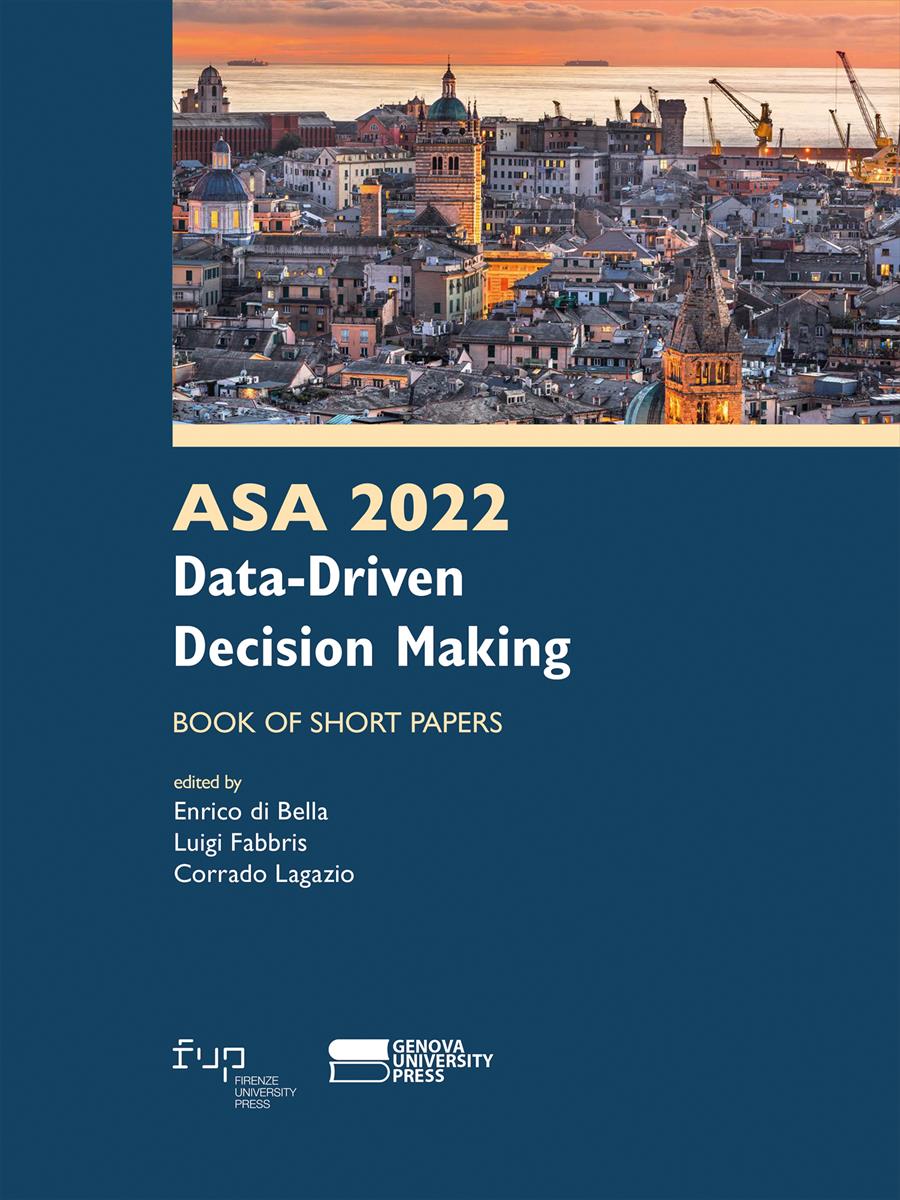- ASA 2022 Data-Driven Decision Making
- Edited by Enrico di Bella, Luigi Fabbris, Corrado Lagazio
Individual and social aspects of after-Covid-19 pandemic depression
- Pasquale Anselmi
- Daiana Colledani
- Simone Di Zio
- Luigi Fabbris
- Egidio Robusto
- © 2023 Author(s) |
- CC BY 4.0
- DOI: 10.36253/979-12-215-0106-3.18
How did individual and social aspects influence depression feelings during the pandemic? In this paper, we analyse the data collected through a survey conducted in the second half of 2021 among a convenience sample of Italian adults. The survey was aimed at highlighting how Italians experienced the pandemic and the way they perceived their future. A total of 556 Italians answered the CAWI survey. The analyses of the collected data show that, while having been infected by the virus or having had a family member infected by it did not influence the depression level, other individual characteristics and subjective feelings did. In particular, being female, younger, having had low trust in information delivered by television, no experiences of smart working or remote learning, little support from friends and family, and being unable to imagine the future increased the likelihood to feel higher levels of depression. Being able to imagine the future mediated the relationships of age and smart working or remote learning experiences with depression. The results indicate that, having a lower ability to imagine the future, younger people and individuals who did not work or study remotely have also a greater tendency to feel depressed.
- Keywords:
- Depression,
- Covid-19,
- Individual and social aspects,
University of Padua, Italy - ORCID: 0000-0003-2982-7178
University of Padua, Italy - ORCID: 0000-0003-2840-9193
University of Chieti-Pescara G. D'Annunzio, Italy - ORCID: 0000-0002-9139-1451
Tolomeo studi e ricerche, Padua and Treviso, Italy - ORCID: 0000-0001-8657-8361
University of Padua, Italy - ORCID: 0000-0002-7583-2587
- Bjelland, I., Krokstad, S., Mykletun, A., Dahl, A.A., Tell, G.S., Tambs, K. (2008). Does a higher educational level protect against anxiety and depression? The HUNT study. Social Science & Medicine, 66(6): 1334–1345.
- Chen, F., Zheng, D., Liu, J., Gong, Y., Guan, Z., Lou, D. (2020). Depression and anxiety among adolescents during COVID-19: A cross-sectional study. Brain, Behavior, and Immunity, 88: 36–38.
- Connor, K.M. Davidson, R.T. (2003). Development of a new resilience scale: The Connor-Davidson Resilience Scale (CD-RISC), Depression and Anxiety, 18: 76–82.
- Costantini, L., Pasquarella, C., Odone, A., et al. (2021). Screening for depression in primary care with Patient Health Questionnaire-9 (PHQ-9): A systematic review. Journal of Affective Disorders, 279: 473–483.
- Elbay, R. Y., Kurtulmuş, A., Arpacıoğlu, S., & Karadere, E. (2020). Depression, anxiety, stress levels of physicians and associated factors in Covid-19 pandemics. Psychiatry Research, 290, 113-130.
- Ellul, M.A., Benjamin, L., Singh, B., Lant, S., Michael, B.D., Easton, A, Kneen, R., Defres, S., Sejvar, J., Solomon, T. (2020) Neurological associations of COVID-19. Lancet Neurology, 19: 767–783.
- Iadecola, C., Anrather, J., Kamel, H. (2020). Effects of COVID-19 on the nervous system. Cell,183:16–27.
- Klaser, K., Thompson. E.J., Nguyen, L.H., et al. (2021). Anxiety and depression symptoms after COVID-19 infection: results from the COVID Symptom Study app. Journal of Neurology Neurosurgery & Psychiatry, 92: 1254–1258.
- Kroenke, K., Spitzer, R.L., Williams, J.B. (2001). The PHQ‐9: validity of a brief depression severity measure. Journal of General Internal Medicine, 16(9): 606–613.
- Manea, L., Gilbody, S., McMillan, D. (2012). Optimal cut-off score for diagnosing depression with the Patient Health Questionnaire (PHQ-9): a meta-analysis. CMAJ, 184: E191–E196.
- Manea, L., Gilbody, S., McMillan, D. (2015). A diagnostic meta-analysis of the Patient Health Questionnaire-9 (PHQ-9) algorithm scoring method as a screen for depression. General Hospital Psychiatry, 37(1): 67–75.
- Mattioli F., Stampatori C., Righetti F., Sala E., Tomasi C., De Palma G. (2021). Neurological and cognitive sequelae of Covid-19: a four month follow-up. Journal of Neurology, 268(12):4422-4428.
- Medda, E., Toccaceli, V., Gigantesco, A., Picardi A., Fagnani, C., Stazi, M.A. (2022). The COVID-19 pandemic in Italy: Depressive symptoms immediately before and after the first lockdown. Journal of Affective Disorders 298: 202–208.
- Muthén, B.O., Muthén, L.K. (2012). Mplus Version 7: User’s Guide. Muthén & Muthén, Los Angeles, (CA).
- Pezzini, A., Padovani, A. (2020). Lifting the mask on neurological manifestations of COVID-19. Nature Review Neurology, 16: 636–644.
- Rogers, J.P., Chesney, E., Oliver, D., Pollak, T.A., McGuire. P., Fusar-Poli. P., Zandi. M.S., Lewis. G., David, A.S. (2020). Psychiatric and neuropsychiatric presentations associated with severe coronavirus infections: a systematic review and meta-analys
- Santomauro, D. and COVID-19 Mental Disorders Collaborators (2021). Global prevalence and burden of depressive and anxiety disorders in 204 countries and territories in 2020 due to the COVID-19 pandemic. The Lancet, 398: 1700-1712.
- Taquet, M., Luciano, S., Geddes, J.R., et al. (2021). Bidirectional associations between COVID-19
- and psychiatric disorder: retrospective cohort studies of 62354 COVID-19 cases in the USA. Lancet Psychiatry, 8: 130–140.
- Vindegaard, N., Benros, M.E. (2020). COVID-19 pandemic and mental health consequences: systematic review of the current evidence. Brain, Behavior, and Immunity, 89:531–542.
Chapter Information
Chapter Title
Individual and social aspects of after-Covid-19 pandemic depression
Authors
Pasquale Anselmi, Daiana Colledani, Simone Di Zio, Luigi Fabbris, Egidio Robusto
Language
English
DOI
10.36253/979-12-215-0106-3.18
Peer Reviewed
Publication Year
2023
Copyright Information
© 2023 Author(s)
Content License
Metadata License
Bibliographic Information
Book Title
ASA 2022 Data-Driven Decision Making
Book Subtitle
Book of short papers
Editors
Enrico di Bella, Luigi Fabbris, Corrado Lagazio
Peer Reviewed
Publication Year
2023
Copyright Information
© 2023 Author(s)
Content License
Metadata License
Publisher Name
Firenze University Press, Genova University Press
DOI
10.36253/979-12-215-0106-3
eISBN (pdf)
979-12-215-0106-3
eISBN (xml)
979-12-215-0107-0
Series Title
Proceedings e report
Series ISSN
2704-601X
Series E-ISSN
2704-5846
